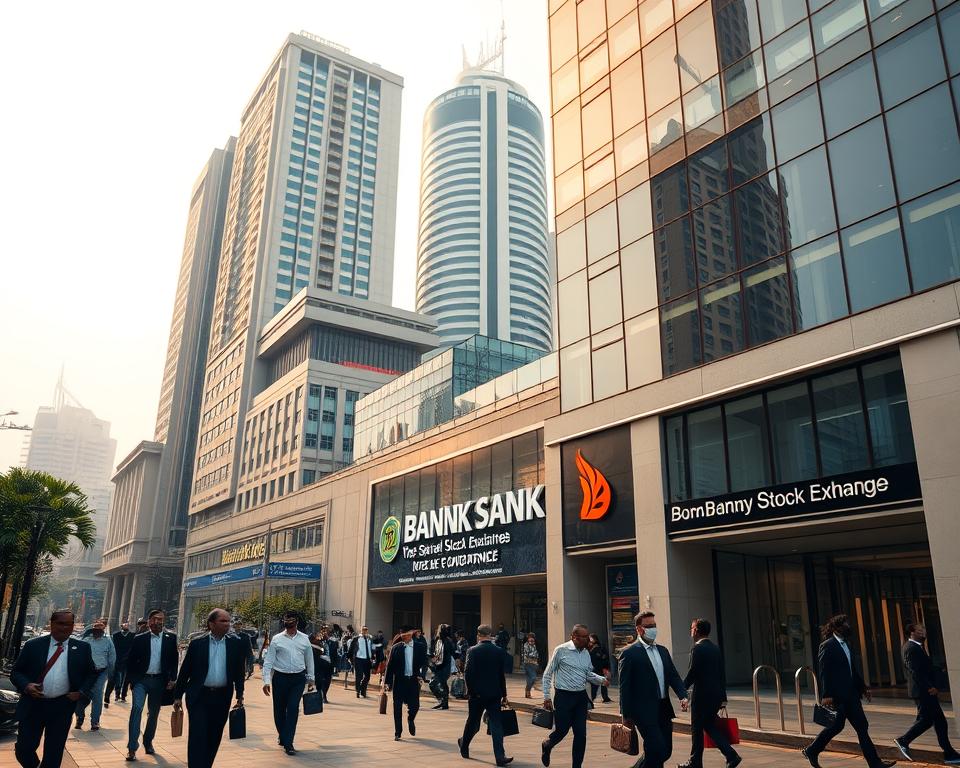Mumbai is India’s financial hub, full of job chances in the finance sector. The city’s banks and financial places are always busy.
There’s a big need for skilled people in Mumbai banking jobs. Many banks and financial groups have jobs. To do well, keep up with the latest openings and know what the industry wants.
Whether you’re new or have experience, Mumbai’s finance sector has lots to offer. You can work in retail banking or investment banking. There are many career paths to choose from.
Key Takeaways
- Explore various banking positions available in Mumbai.
- Understand the current state of the finance sector.
- Learn tips for finding and applying for banking jobs.
- Stay updated on the latest openings in the finance sector.
- Discover the career paths available in the banking industry.
The Current State of Mumbai’s Banking Sector
The Mumbai banking sector is changing fast. This is thanks to new tech and what people want. Banks are now using digital solutions to keep up. This makes the sector very lively.

Key Banking Institutions in Mumbai
Mumbai has many banks. These include public, private, foreign, and cooperative banks. State Bank of India, HDFC Bank, and ICICI Bank are big names here. They are important for the country’s money system.
- Public Sector Banks: State Bank of India, Bank of Baroda
- Private Sector Banks: HDFC Bank, ICICI Bank, Axis Bank
- Foreign Banks: Citibank, Standard Chartered
Recent Growth Trends and Market Outlook
The Mumbai banking sector has grown a lot. This is because more people want digital banking and the middle class is getting bigger. The sector is expected to keep growing. Banks will focus on digital transformation and customer-centric services.
A recent report says the banking sector in Mumbai will grow a lot. This is because people need more financial services and the rules are good. Banks are spending a lot on tech to offer better services and stay ahead.
Banking Jobs in Mumbai – Latest Openings in Finance Sector
Mumbai’s banking job market is booming. New finance roles are popping up all over the city. It’s a great place for banking pros to find new jobs.

Current Job Market Analysis
The banking job market in Mumbai is strong. Old banks and new fintech companies are making it exciting. There are more job openings than ever before.
Digital banking, risk management, and customer service are in high demand. The rise of digital banking means more jobs for tech and data experts.
Emerging Opportunities in 2023-2024
Looking to 2023-2024, Mumbai’s banking job market will see new chances. Jobs in sustainable finance, cybersecurity, and financial inclusion are on the rise.
“The future of banking is not just about financial transactions; it’s about creating a more sustainable and inclusive financial ecosystem.”
As banks meet new consumer needs and rules, certain skills will be more sought after.
Demand-Supply Gap in Various Banking Roles
Even with more jobs, some banking roles are short on talent. Risk management and compliance are struggling to find enough skilled people.
| Banking Role | Demand Level | Supply Level |
|---|---|---|
| Risk Management | High | Low |
| Digital Banking | High | Medium |
| Customer Service | Medium | High |
This gap shows the need for banking pros to get specific skills to stand out.
Types of Banking Positions Available in Mumbai
Mumbai, India’s financial capital, has many banking jobs. These jobs cover different areas, each with its own tasks and needs.
Retail Banking Roles
Retail banking in Mumbai includes many roles. These range from helping customers to managing their wealth. Key tasks are managing accounts, handling loans, and supporting customers.
Corporate Banking Positions
Corporate banking is big in Mumbai. It helps businesses with money solutions and more. Corporate bankers help with business deals and give financial advice.
Investment Banking Opportunities
Investment banking is exciting and profitable. It helps clients get money, advises on big deals, and manages money. Mumbai’s investment banking is lively, with many chances for big projects.
“The future of banking is not just about transactions; it’s about creating value for our customers through innovative financial solutions.”
Fintech and Digital Banking Jobs
Fintech and digital banking are growing fast in Mumbai. Jobs here include managing digital products, keeping data safe, and analysing data. As banking goes digital, the need for these experts grows.
| Banking Sector | Key Roles | Skills Required |
|---|---|---|
| Retail Banking | Customer Service, Wealth Management | Communication, Sales |
| Corporate Banking | Financial Analysis, Cash Management | Analytical, Problem-Solving |
| Investment Banking | Mergers & Acquisitions, Capital Raising | Financial Modelling, Negotiation |
| Fintech & Digital Banking | Digital Product Management, Cybersecurity | Technical, Innovation |
Entry-Level Banking Opportunities for Fresh Graduates
Mumbai is a great place for fresh graduates to find entry-level banking jobs. The city’s banking sector is always looking for new talent. It’s a perfect place to start a banking career.
Trainee Positions and Management Programmes
Many banks in Mumbai have trainee positions and management programmes for fresh graduates. These programmes give you real experience and teach you about banking. For example, ICICI Bank’s Management Trainee Programme is known for its tough training and chances to grow.
These programmes help you learn the skills you need. They also often lead to a job at the bank. It’s good for both you and the bank.
Internship Opportunities That Lead to Jobs
Internships are key for fresh graduates. Banks like HDFC Bank and Axis Bank offer internships that can turn into full-time jobs. You get to learn from the industry and might even get paid.
Goldman Sachs’ Summer Internship Programme is a top choice. It’s tough but gives you a chance to see what investment banking is like. It’s a great way to learn and meet people in your field.
| Bank | Programme Name | Duration |
|---|---|---|
| ICICI Bank | Management Trainee Programme | 12-18 months |
| HDFC Bank | Internship Programme | 2-3 months |
| Axis Bank | Graduate Development Programme | 12 months |
As highlighted by
“The best way to get started is to quit talking and begin doing.” – Walt Disney
Starting an internship or trainee programme is a big step. It can really help your career.
Qualifications Required for Banking Jobs in Mumbai
To do well in Mumbai’s banking world, knowing what qualifications you need is key. The banking field is very specific. Employers want people with certain education and professional skills.
Educational Requirements by Position Level
The education needed for banking jobs in Mumbai changes with the job level. For starting jobs, a bachelor’s degree in finance, economics, or a similar field is common. For higher roles, like managers, a master’s degree in business or a related area is usually needed.
| Position Level | Typical Educational Requirement |
|---|---|
| Entry-Level | Bachelor’s degree in Finance, Economics, or related fields |
| Mid-Level | Bachelor’s degree; MBA or certifications like CFA/CFR preferred |
| Senior-Level | MBA or related postgraduate degree; professional certifications like CFA |
Professional Certifications That Give You an Edge
Along with education, professional certifications can really help you stand out in Mumbai’s banking world. Certs like Chartered Financial Analyst (CFA), Certified Financial Planner (CFP), and Certified Risk Manager (CRM) are very valued. They show you’re serious about your career and have the skills to back it up.
By working on both your education and getting certifications, you can get ahead in Mumbai’s tough job market.
Essential Skills for Success in Mumbai’s Banking Sector
To do well in Mumbai’s banking world, you need both technical and soft skills. The field is always changing. You must keep learning and adapting to new tech and trends.
Technical Skills and Domain Knowledge
Technical skills are key for banking jobs in Mumbai. You need to be good at financial analysis, risk management, and digital banking. Knowing a lot about investment banking, corporate banking, and financial rules is also important.
Experts in data analysis are very sought after. They help make important business decisions with their insights.
Key technical skills include:
- Financial modeling and forecasting
- Knowledge of banking software and technologies
- Understanding of financial regulations and compliance
Soft Skills and Personality Traits
While technical skills are important, soft skills and personality traits matter too. Good communication, teamwork, and problem-solving are vital. Being adaptable, resilient, and customer-focused is also valued.
Important soft skills include:
- Communication and interpersonal skills
- Leadership and teamwork abilities
- Adaptability and stress management
Step-by-Step Guide to Finding Banking Jobs in Mumbai
Finding a banking job in Mumbai needs a smart plan. Start with good research and a solid job search strategy. The city’s banking world is big and competitive, with lots of chances in different roles and places.
Researching Target Banks and Positions
First, look into possible employers and jobs. Find big banks and financial groups in Mumbai, like State Bank of India, HDFC Bank, and ICICI Bank. Check their career sites for job openings. Knowing what the job needs and the company’s culture helps make your application better.
Online Job Portals and Banking-Specific Websites
Use online job sites like Naukri.com, LinkedIn, and indeed to find banking jobs in Mumbai. These sites list many jobs, from beginner to top roles. Also, look at banking-specific websites and forums for more job tips and listings.
Recruitment Agencies Specialising in Finance
Finance and banking recruitment agencies are great for job hunters. Companies like Michael Page, Robert Walters, and KPMG have special job openings. They can also help with applying for jobs.
Networking and Industry Events
Networking is key in finding a job. Go to industry events, conferences, and seminars. This lets you meet banking professionals.
“Networking is not about just connecting people. It’s about connecting people with people, people with opportunities.”
Getting to know people in the industry can give you useful tips and maybe even a job.
Creating a Standout CV for Banking Positions
To stand out in Mumbai’s banking job market, make a CV that shows your skills and experience. A good CV is key to getting noticed by employers in the competitive banking sector.
Essential Sections to Include
A banking CV should have several key sections. These are:
- Personal Details: Include your contact information and a professional summary.
- Education: List your relevant qualifications and certifications.
- Work Experience: Highlight your experience in the banking sector, focusing on achievements and responsibilities.
- Skills: Enumerate your technical and soft skills relevant to banking.
- Certifications and Awards: Mention any professional certifications or awards you’ve received.
| Section | Details to Include |
|---|---|
| Personal Details | Contact information, professional summary |
| Education | Relevant qualifications, certifications |
| Work Experience | Achievements, responsibilities in banking |
| Skills | Technical and soft skills relevant to banking |
Highlighting Relevant Experience and Skills
When highlighting your experience, focus on achievements. For skills, highlight those relevant to banking, like financial analysis or customer service.
Example: Instead of saying “responsible for managing customer accounts,” say “successfully managed a portfolio of customer accounts, resulting in a 25% increase in customer satisfaction.”
Common CV Mistakes to Avoid
Avoid common mistakes like typos and irrelevant information. Make sure your CV is concise, clear, and tailored to the banking position.
Tip: Customize your CV for each job application. Highlight the skills and experiences that match the job requirements.
Mastering the Banking Job Application Process
To stand out in Mumbai’s competitive banking sector, mastering the job application process is key. A well-structured application shows off a candidate’s skills and experience. It also shows they understand the banking industry’s needs.
Crafting Effective Cover Letters
A cover letter is often the first thing a candidate sends to a company. It should highlight relevant experience and skills. Key elements include a compelling introduction, a clear body that outlines the candidate’s value proposition, and a professional closing.
To make a cover letter effective, candidates should:
- Address the hiring manager by name, if possible.
- Clearly state the position they are applying for.
- Highlight their most relevant achievements and qualifications.
Online Application Tips
Online applications need a strategic approach to stand out. Candidates should ensure their CV and cover letter are optimized for applicant tracking systems (ATS) by using relevant keywords from the job description.
| Tip | Description |
|---|---|
| Use keywords | Incorporate relevant terms from the job posting. |
| Format correctly | Save documents in compatible formats (e.g., PDF, Word). |
| Proofread | Carefully check for spelling and grammar errors. |
Following Up on Applications
Following up on an application shows a candidate’s interest in the position. A polite and professional follow-up email or phone call can make a significant difference.
Best practices for follow-up include:
- Waiting an appropriate amount of time after applying.
- Being concise and to the point.
- Reiterating interest in the position.
Preparing for Banking Assessments and Interviews
To get a banking job in Mumbai, you need more than a good resume. You must prepare well for tests and interviews. The banking world in Mumbai is very competitive. Many skilled people want a few jobs.
Common Aptitude and Psychometric Tests
Many banks in Mumbai use tests to hire. These tests check your math, reading, and problem-solving skills. Use online tools and practice tests to get ready.
Technical Knowledge Assessment
These tests check if you know about banking, finance, and software. Learn about banking, markets, and rules. This will help you do well.
Interview Questions and Winning Responses
Interviews ask about your past, skills, and how you handle stress. Think of times when you managed tough tasks well. This shows your ability to handle pressure.
“The way you present yourself in an interview can make or break your chances. Be confident, be clear, and show your passion for the industry.”
Group Discussion Strategies
Group discussions test your speaking, teamwork, and problem-solving. Practice speaking clearly, listening well, and adding to the conversation.
| Group Discussion Tips | Description |
|---|---|
| Be an Active Listener | Pay attention to others’ viewpoints and respond thoughtfully. |
| Contribute Constructively | Share your ideas and build on others’ suggestions. |
| Stay Calm and Composed | Maintain your composure even in heated discussions. |
Good preparation for tests and interviews can really help. It can increase your chances of getting a job in Mumbai’s banking sector.
Salary Expectations and Negotiation Tips
Knowing the average salaries in Mumbai’s banking sector is key. It helps job seekers a lot. Understanding current trends is vital for good salary talks.
Average Salaries by Position and Experience
The banking sector in Mumbai has different salaries. They depend on the job and experience. Here are some average salary ranges:
- Entry-level positions: ₹4-6 lakhs per annum
- Mid-level positions: ₹8-12 lakhs per annum
- Senior-level positions: ₹20-30 lakhs per annum
These figures are just examples. Salaries can change based on the bank, location, and more.
Benefits and Perks in the Banking Sector
Banking jobs in Mumbai offer great benefits and perks. These include:
- Health insurance
- Retirement plans
- Paid leave
- Performance bonuses
Effective Salary Negotiation Strategies
To negotiate salary well, candidates should:
- Research the market standards
- Highlight their skills and experience
- Be confident but realistic in their expectations
Good salary negotiation can get you a better deal.
Work Culture and Work-Life Balance in Mumbai’s Banking Sector
The work culture in Mumbai’s banking sector is intense and competitive. People in banking work long hours. The environment is high-pressure, thanks to fast financial transactions and competition.
Working Hours and Environment
Banking professionals in Mumbai often work over 12 hours a day. This is true during busy times or when dealing with important financial deals. The work place is known for:
- High stress levels because of the demanding job
- Quick deadlines and the need for fast, smart decisions
- A competitive vibe that encourages new ideas and efficiency
Stress Management and Career Sustainability
Managing stress and keeping a career going in Mumbai’s banking needs a plan. Important steps include:
- Sorting tasks and managing time well to cut down on stress
- Using stress-reducing activities like meditation or exercise outside work
- Creating clear lines between work and personal life for a good balance
By using these methods, banking workers can handle job challenges and keep their careers going strong.
Conclusion
Mumbai’s banking sector is always changing and growing. It offers many chances for those wanting to work in finance. The city’s role as a financial centre draws in the best people from all over.
There are many jobs in finance, like retail and corporate banking, and even in fintech. As the sector grows, more skilled people are needed. They should know about digital banking, financial analysis, and managing risks.
Mumbai’s finance sector is set to keep growing. This is thanks to new technology, changing customer needs, and the city’s global role. To do well, people need to be flexible, creative, and always learning.
Knowing about the banking sector, the jobs available, and the skills needed helps. It prepares people for success in this fast-changing field.


